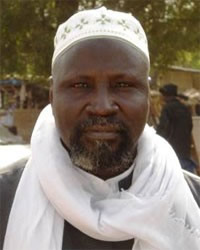Jahanka in Senegal

Photo Source:
Copyrighted © 2026
GoWestAfrica All rights reserved. Used with permission |
Send Joshua Project a map of this people group.
|
| People Name: | Jahanka |
| Country: | Senegal |
| 10/40 Window: | Yes |
| Population: | 68,000 |
| World Population: | 138,300 |
| Primary Language: | Jahanka |
| Primary Religion: | Islam |
| Christian Adherents: | 0.00 % |
| Evangelicals: | 0.00 % |
| Scripture: | Translation Started |
| Ministry Resources: | No |
| Jesus Film: | No |
| Audio Recordings: | Yes |
| People Cluster: | Manding |
| Affinity Bloc: | Sub-Saharan Peoples |
| Progress Level: |
|
Introduction / History
The Jahanka people claim to be descendants of a great 15th century West African cleric. Their Muslim tradition avoids the notion of jihad (holy war) in favor of pacifism, and they feel no need to convert others to Islam. Even so, they are almost 100 percent Muslim as a people group.
Where Are they Located?
The Jahanka people live in Senegal, a West African nation on the shores of the Atlantic Ocean.
What Are Their Lives Like?
Various Jahanka villages are independent of each other and of the local chiefs. The Jahanka people are committed to peaceful coexistence and refuse to become engaged in politics or war. When threatened, they simply relocate their villages into safer territory. Their villages enjoy the privileges of sanctuary, judicial independence, and freedom from military service.
Although the Jahanka are small in number, they are a very significant group in Senegal. Formerly, they supported themselves through their activities as religious teachers; however, when they lost their slaves, they were forced to devote more time to farming and less time to religious studies. Nevertheless, many are still active Muslim teachers.
Jahanka people value education and scholarship and are known for their success in commerce and other professions. However, as urbanization has accelerated in recent years, the Jahanka people have become more dispersed, and the pressures of modernization have become more acute.
What Are Their Beliefs?
Jahanka beliefs are best characterized by a staunch dedication to Islam, historical accuracy, rejection of jihad, non-involvement in political affairs, and the religious instruction of young people. There is an indication there are a few followers of Jesus among them, although there is no evidence of a church or gathering among them.
What Are Their Needs?
Pride in a person's knowledge often is a stumbling block to simple faith in the finished work of Christ. Jahanka people desperately need to come to the end of themselves and see that they have no hope apart from the Savior who gave His life in their place for their sins. Conversions among them would greatly impact the general Muslim community in Senegal. In particular the religious teachers of their communities need to be targeted. Perhaps Christian educators and professionals who could present the gospel in culturally relevant ways would be one avenue to reach the Jahanka. There are no scriptures in their own language; no JESUS Film in their own language, no Christian broadcasts in their own language, and no mission agencies working among this people.
Prayer Points
Ask the Lord to send missionaries to share the good news with the Jahanka of Senegal. Pray that Christian radio broadcasts, evangelical literature, and the JESUS Film will become widely used by the Jahanka people.
Pray that God will call Christian educators and professionals to minister the love of Jesus to the Jahanka people.
Ask the Lord to save key leaders among the Jahanka who will boldly declare the gospel.
Pray that strong local churches and disciple making movements will be established among the Jahanka people.
Pray for the Holy Spirit to birth a cascading discipleship movement among the Jahanka people in Senegal for God's glory.